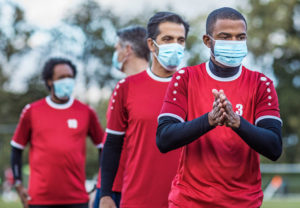Jul 13, 202294% of Athletes Had Little to No Symptoms After Testing Positive for COVID-19
A recent study from the British Journal of Sports Medicine suggests that the majority of athletes who tested positive for COVID-19 had either no symptoms or mild acute symptoms.
Results from the study revealed that 94.1% of athletes who tested positive for COVID-19 were asymptomatic or experienced mild acute symptoms; however, persistent symptoms in 8.3% of athletes could affect their return to play.
 A report from Healio.com outlined the study’s results and how they went about gathering the data. Below is an excerpt from that report.
A report from Healio.com outlined the study’s results and how they went about gathering the data. Below is an excerpt from that report.
Using MEDLINE, EMBASE, SCOPUS, and SPORTDiscus databases, researchers performed a systematic review of 43 studies that included 11,518 professional, amateur, or collegiate athletes who tested positive for COVID-19 and were published between 2019 and 2022.
Overall, 35 studies reported acute COVID-19 presentations in 5,709 athletes. Among these athletes, 25.5% were asymptomatic; 68.6% exhibited mild acute symptoms; 6.7% exhibited moderate acute symptoms; 1.3% exhibited severe acute symptoms.
Additionally, 11 studies reported post-acute COVID-19 presentations, which were broadly defined as those that emerged, persisted, or returned after the active phase of infection, according to the study. Researchers found that 8.3% of athletes (range of 3.8% to 17% in the literature) exhibited persistent COVID-19 symptoms, such as anosmia or dysgeusia, cough, fatigue, chest pain, and headache.
» ALSO SEE: Health Benefits of BCAAs in Everyday Life
Among athletes who underwent any cardiac testing, 5% exhibited myocardial involvement, while 2.5% of athletes who underwent MRI exhibited myocardial involvement. After analyzing the studies that included a control group of uninfected athletes, researchers could not confirm a causal relationship between COVID-19 and myocardial involvement.
“A small proportion of athletes experienced persistent symptoms while recovering from the infection, which was mostly mild in nature, but could affect return to play decisions and timing,” the researchers wrote in the study. “Future studies should incorporate control athletes (ie, non-infected) and systematically follow athletes with COVID-19 to better understand the predictors and natural course of post-acute signs among athletes.”



